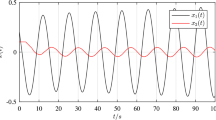Abstract
This paper is concerned with the absolute stabilization problem of a class of singular systems with feedback connected ferromagnetic hysteresis nonlinearities. Firstly, a novel differential-integral loop transformation framework is developed to achieve an augmented singular system model. Secondly, by constructing a new passive output derivative operator of hysteresis nonlinearity and establishing the bound condition of the solution of ferromagnetic hysteresis model, the equivalent absolute stability criterion of singular systems with hysteresis feedback is derived based on KYP method and LMIs technique. Furthermore, the strict LMIs conditions for absolute stabilization are obtained, which can easily be checked by the LMI toolbox in MATLAB. Finally, two examples are given to illustrate the effectiveness of the proposed method.
Similar content being viewed by others
References
Khalil H K. Nonlinear Systems. 3rd ed. New York: Prentice Hall, 2001. 18–280
Brokate M, Sprekels J. Hysteresis and Phase Transitions. New York: Springer-Verlag, 1996. 22–121
Visintin A. Differential Models of Hysteresis. New York: Springer-Verlag, 1994. 12–265
Su C Y, Wang Q Q, Chen X K, et al. Adaptive variable structure control of a class of nonlinear system with unknown Prandtl-Ishlinskii hysteresis. IEEE Trans Automat Contr, 2005, 50: 2069–2074
Oh J H, Bernstein D S. Semilinear Duhem model for rate-independent and rate-dependent hysteresis. IEEE Trans Automat Contr, 2005, 50: 631–645
Pare T, Hassibi A, How J. A KYP lemma and invariance principle for systems with multiple hysteresis nonlinearities. Int J Control, 2001, 74: 1140–1157
Ren B B, Ge S S, Su C Y, et al. Adaptive neural control for a class of uncertain nonlinear systems in pure-feedback form with hysteresis input. IEEE Trans Syst Man Cy-B, 2009, 39: 431–443
Mao J Q, Ding H S. Intelligent modeling and control for nonlinear systems with rate-dependent hysteresis. Sci China Ser F-Inf Sci, 2009, 52: 656–673
Wei J D, Sun C T. Constructing hysteretic memory in neural networks. IEEE Trans Syst Man Cy-B, 2000, 30: 601–609
Li C T, Tan Y H. Adaptive output feedback control of systems preceded by the Preisach-type hysteresis. IEEE Trans Syst Man Cy-B, 2005, 35: 130–135
Jönsson U. Stability of uncertain systems with hysteresis nonlinearities. Int J Robust Nonli, 1998, 8: 279–293
Yakubovich V A. The method of matrix inequalities in the theory of stability of nonlinear controlled systems: absolute stability of systems with hysteresis nonlinearities. Automat Rem Contr, 1965, 26: 753–763
Krasnoselskii A M, Pokrovskii A V. Dissipativity of a nonresonant pendulum with ferromagnetic friction. Automat Rem Contr, 2006, 67: 221–232
Gorbet R B, Morris K A, Wang D W L. Passivity-based stability and control of hysteresis in smart actuators. IEEE Trans Contr Syst T, 2001, 9: 5–16
Hodgdon M L. Applications of a theory of ferromagnetic hysteresis. IEEE Trans Magn, 1988, 24: 218–221
Sabir M. Constitutive relations for magneto-mechanical hysteresis in ferromagnetic materials. Int J Eng Sci, 1995, 33: 1233–1249
Song Z, Zhang H G, Liu D R. An adaptive control method for a class of uncertain nonlinear systems with ferromagnetic hysteresis nonlinearity. In: Proceedings of 27th Chinese Control Conference. Beijing: Beijing University of Aeronautics and Astronautics Press, 2008. 24–28
Yang C Y, Zhang Q L, Zhou L N. Strong absolute stability of Lur’e descriptor systems: Popov-type criteria. Int J Robust Nonlin, 2009, 19: 786–806
Zhang L Q, Lam J, Xu S Y. On positive realness of descriptor systems. IEEE Trans Circuit S-I, 2002, 49: 401–407
Yang C Y, Zhang Q L, Lin Y P, et al. Positive realness and absolute stability problem of descriptor systems. IEEE Trans Circuit S-I, 2007, 54: 1142–1149
Lee L, Chen J L. Strictly positive real lemma and absolute stability for discrete-time descriptor systems. IEEE Trans Circuit S-I, 2003, 50: 788–794
Lewis F L. A survey of linear singular systems. Circ Syst Signal Pr, 1986, 5: 3–36
Xu S Y, Lam J. Robust Control and Filtering of Singular Systems. Berlin: Springer-Verlag, 2006. 119-140
Yin G, Zhang J F. Hybrid singular systems of differential equations. Sci China Ser F-Inf Sci, 2002, 45: 241–258
Liao X X. Absolute Stability of Nonlinear Control Systems. Beijing: Science Press, 2006. 221–242
Author information
Authors and Affiliations
Corresponding author
Rights and permissions
About this article
Cite this article
Zhang, H., Wang, Y. & Song, Z. Absolute stabilization of singular systems with ferromagnetic hysteresis nonlinearity. Sci. China Inf. Sci. 56, 1–14 (2013). https://doi.org/10.1007/s11432-011-4315-7
Received:
Accepted:
Published:
Issue Date:
DOI: https://doi.org/10.1007/s11432-011-4315-7




